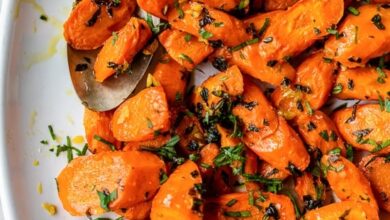Pomegranate fights cancer
Written by: Hiyaguha Cohen
February 28, 2021
Health blog
Article overview:
- One study found that a substance in pomegranates can slow or even stop breast cancer tumors from growing.
- Scientists believe the compounds in pomegranates can also help regulate estrogen levels and menopausal symptoms.
- Studies have also shown that pomegranate is useful in fighting prostate cancer.
Study of Pomegranates and Breast Cancer
If an apple a day doesn't keep the doctor away, it could be that its cousin, the pomegranate, looks the same. One study found that a substance in pomegranates can slow or even stop breast cancer tumors from growing. The study just published in Cancer Prevention Research found 10 phytochemicals in pomegranates that appear to inhibit the growth of estrogen-responsive breast tumors. The phytochemicals called ellagitannins block an enzyme called aromatase that feeds estrogen and plays a key role in breast tumor growth. The ellagitannin called urolithin B had the strongest inhibitory effect.
As I mentioned earlier, different fruits have different blends of ellagitannins, with each blend having a different emphasis on benefits. While the blend of ellagitannins in red raspberries seems particularly good at combating colon cancer, pomegranates now seem to offer particular benefits in dealing with breast cancer. The study also confirms what I've been saying about ellagic acid for years – that the health benefits of pomegranates and raspberries reside in the ellagitanins, not the ellagic acid offered by some supplement manufacturers.
Many of the main drugs given to patients with estrogen-dependent breast tumors work similarly to the ellagitannins and also inhibit aromatase. The director of the study, Dr. However, Shiuan Chen of Hope City Cancer Research and Treatment Center in Duarte, Calif., Said patients should not try to substitute pomegranate for their drugs. "We don't recommend that people use this as a substitute for the AI," said Dr. Chen. "They (pomegranate compounds) aren't as effective as the real drugs, so we think the interest is probably more on prevention than therapeutic purpose."
Other experts also warn against using pomegranate as a medication substitute. According to Gary Stoner of Ohio State University, "It is not clear whether these levels can be achieved in animals or humans because the (compounds) are not absorbed well into the blood when they are eaten."
Researchers surprised by results
The researchers didn't expect the pomegranate derivatives to be as effective as they are. "We were surprised by our results," said Dr. Chen. “We previously found that other fruits like grapes can inhibit aromatase. But phytochemicals in pomegranates and grapes are different. "
The surprising factor here is that the researchers found their results surprising. Finally, in 2004 I wrote about the cancer-fighting properties of pomegranates, specifically mentioning breast cancer. This is one of the reasons why I included pomegranate in my superfood formula and wrote on August 30, 2004, “Supplementing with pomegranate extract is useful if you are into cancer prevention, maintaining a healthy heart, lowering bad cholesterol, the Lowering blood pressure and protecting against free radicals and aging. “That same year, the European Journal of Cancer Prevention published a study discussing the breast cancer-fighting properties of pomegranate juice and pomegranate oil when administered to mice.
Pomegranates for regulating estrogen and heart health
The fact is, supplementing with an antioxidant-rich pomegranate won't hurt in the worst case scenario. Scientists believe the compounds in pomegranates may play a role in regulating estrogen levels and regulating menstrual and menopausal symptoms. This means that pomegranate can help reduce cramps, mood swings, hot flashes, etc. And then there are all the other benefits associated with the fruit – and there are many of them.
For one, research shows that pomegranate lowered risk factors for heart disease not only in laboratory tests, but also in preliminary human studies. A 2004 study published in the Journal of Clinical Nutrition found that patients with severe carotid artery stenosis reduced arterial plaque by 35 percent, bad cholesterol by 20 percent, and cholesterol by ingesting a cup of pomegranate juice daily for a year of oxidation by 90 percent and lowering blood pressure in just two weeks. A year later, a study published in the American Journal of the College of Cardiology found that drinking a cup of pomegranate juice every day improved the amount of oxygen reaching the heart muscle of patients with heart disease in just three months. All in all, one wonders what Gary Stoner was referring to when he said, "(These compounds) do not get well absorbed into the blood when they are on the diet."
Pomegranates for prostate cancer
Several studies have found pomegranate to be useful in fighting prostate cancer. Research from Stanford University, which was completed last August, found that men with prostate cancer who drank a glass of pomegranate juice a day had much slower cancer cell proliferation than men who did not drink the juice. The researchers tracked 48 men over a five-year period, and it took those who drank the juice four times as long to double their PSA test markers compared to those who did not drink the juice. Studies have also shown that pomegranate juice can prevent skin and lung cancer.
Other conditions that improve after consuming pomegranate include erectile dysfunction, arthritis, dental plaque, and diarrhea. In addition, pomegranate juice is antibacterial and antiviral.
To enjoy the benefits of pomegranate, you can drink pomegranate juice (but make sure it isn't sweetened and raw chilled juice is best – not as heavily pasteurized), ingesting pomegranate extract supplements, whipping up the fruit and eating it, or as part of one Superfood formula.



